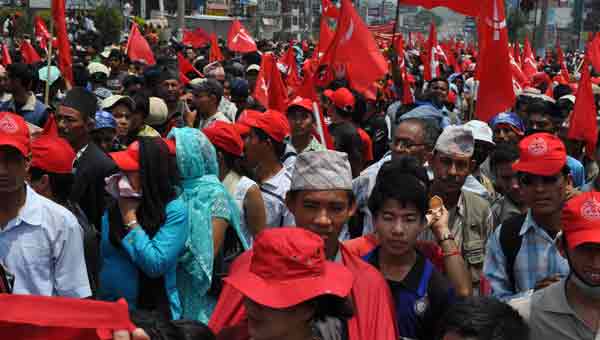Kathmandu, Nepal - I am standing in the middle of a mass of red flags held up by an ocean of people in the capitol of Nepal, Kathmandu.

An estimated 100,000 protesters amassed in Kathmandu, among them villagers who wanted to see the capital for the first time. CNN/Sumnima Udas
Printed in white on the flags is the sickle, the sign of the United Communist Party of Nepal Maoists. Some of the protestors are chanting as loud as they can, but as I look around many simply have a look of wonder on their faces. It seems a bit odd considering the massive rally was planned by the Maoist party and attended by its supporters.
"Why are you here?" I asked a woman happily squatting and chatting with her lady friends by the side of the road.
"I don't know. Uh, we just came for the program," she said.
It turns out some of the 100,000 estimated protesters had just come to the city because they had never seen the city before. They live in villages hours or even days away, and for some the trip was free, courtesy of their favorite political party.
It was the village folks’ chance to see something interesting and, oh yeah, support their political party. They were mixed in with dire hardline Maoists. Some of the marchers were former rebels; others simple citizens angry with the government in power because they say everyday citizens haven't benefited from it.
The whole scene is eye-catching. Hard-core supporters with strong views chant, while others smile, sing, play music and dance as if at a street party. It is not the scene of violence many feared.
The Maoists and Nepal's government forces have a bloody history. But today the Maoist leader clearly said he was showing everyone the Maoists are capable of a peaceful protest and solution. Bottom line: the party is demanding the government move over and let the Maoists lead the coalition government. After all, they say, they won the majority vote in the landmark 2008 elections.
Nepal is going through the growing pains of moving from a monarchy to a democracy, and simply put, that is hard to do. It is taking much longer than planned. Yet the head of the U.N. mission in Nepal said in many ways the country has managed a great deal since deposing the king. An election was held, parties accepted the results, and the two groups of armed forces - the Army and the former Maoist rebels - are not at each others’ throats, even though they have been enemies for a decade.
It is interesting to watch a fledgling democracy try and find its feet, but the longer the government is unstable, I fear the more the people will suffer. Despite its worldwide reputation for a great place for tourists to visit, Nepal's people still live in one of the poorest countries in the world.
